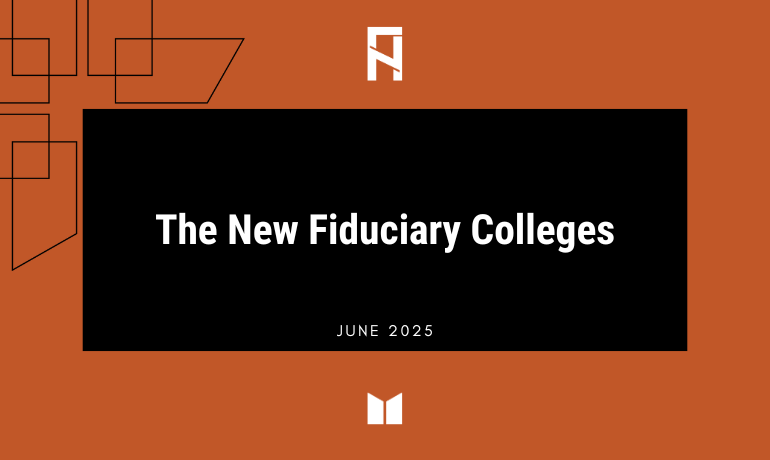College students are graduating to a world they’re told is full of opportunity—“The world is your oyster,” commencement speakers proclaim. But to many young adults, that world feels less like an oyster and more like a predatory shark.
Older generations often underestimate the deep anxiety felt by today’s young adults. For Gen Z, college can feel more like a relational and financial obstacle than a launchpad. Student debt casts a shadow over future relationships—many young women are unwilling to take on a partner’s debt. Meanwhile, the prospects of stable employment and affordable housing remain bleak. Even for those with degrees, joblessness or underemployment is common. Add to this a rising tide of loneliness and existential uncertainty, and it becomes clear that today’s graduates are navigating an unfamiliar world—largely on their own, with few trusted guides.
This is particularly true of Christian men who face a crisis of masculinity, are viewed as intrinsically toxic, and struggle to find their way in an increasingly complex and alienating world. This essay encourages Christian men to rethink how they approach college. It highlights seven features that men need in their lives to launch successfully.
The popular phrase “failure to launch,” popularized in the 2006 romantic comedy starring Matthew McConaughey, has come to serve as a cultural shorthand for young men who struggle to leave home or find their footing. Too often, it is used as an unfair indictment of the character or resilience of men. The truth is more complex. Fortunately there are answers available for them to consider.
Many students enter college expecting it to be the bridge to the American dream. Instead, they graduate burdened by life-altering debt, with few job prospects and no clear path to adulthood. Many end up working service jobs unrelated to their degrees, unable to afford housing in urban areas. In many cases, returning to a parent’s home is not a matter of preference, but economic necessity—if they have that option at all. David Brooks has described today’s youth as “the most rejected generation.” Whether it’s college admissions, summer internships, campus clubs, dating apps, or job applications, rejection is constant. Over time, it becomes part of their identity—as in “Loser.” Men are those most powerfully impacted by these negative forces. Many are suffering in silence.
As Brooks writes:
“Rejection reinforces the dark world mentality that is so prevalent in our culture—the idea that the world is menacing and that people and institutions are untrustworthy…. It is phenomenally hard to be young right now.”
Empathy is in order. Today’s youth are living in a world that feels frightening, unstable, and isolating. “Anxiety” is not just a buzzword—it is the defining emotional experience of a generation. Global research shows a measurable and significant rise in anxiety among young people, driven by a convergence of technological, cultural, developmental, and philosophical disruptions. This is not merely a case of increased self-reporting—it reflects a genuine increase in distress.
We cannot afford to simply lament the situation. What can be done? Can college be reimagined as part of the solution rather than part of the problem?
It can—if it is reshaped around seven key features:
- Affordability
A new kind of college must ensure students can graduate without being saddled with debt. - In-Person Experience
Online and hybrid models—exposed during COVID as socially and emotionally impoverished—only deepen isolation. True community cannot be digitized. - Meaning and Purpose
A college must help students answer the ultimate question: “What is life for?” Education without existential grounding is just going through the motions. - Preparation for Adulthood
Students don’t need another “Adulting 101” seminar. They need immersive communities and work experiences that instill timeliness, courtesy, empathy, and responsibility. Soft skills must be developed alongside academic and technical ones. - Real-World Employability
Students don’t just need a diploma; they need the tools to launch into stable, meaningful work. A college must equip them with durable skills—not push them into the instability of the gig economy. - Fiduciary Leadership
Faculty and administration must be personally invested in student success. The institution’s financial model should align with the student’s outcomes. Like a fiduciary investment firm—legally and ethically bound to act in the client’s best interest—a fiduciary college does better only when its students do better. This alignment builds trust and ensures the institution is not exploiting students for revenue. - Post-Graduation Care
After graduation, the relationship shouldn’t become merely transactional. A fiduciary college continues to walk with its alumni, providing relational, spiritual, and vocational support. A student’s success becomes the school’s enduring pride, not just its past record.
These seven features are rare in today’s academic world. The financial and bureaucratic incentive structures in higher education typically work against them. As a result, many potential students are opting out. The traditional college value proposition is collapsing—young people no longer see it aligned with their actual needs or future well-being.
But if such a college did exist, many students would flock to it—especially as word spreads organically via social media. Because this is what they’re longing for, even if they don’t yet have the words to name it.
This kind of college does exist. Few men even dream that it could.
However, it not for those who merely want to party on the weekends and attend SEC football games. But if you are interested in a life launch pad, these kinds of college should be on your radar.
One example worth considering is Excel College in Black Mountain, North Carolina, It was founded in 2016 precisely designed to meet these needs. A small, mission-driven micro-college, Excel is designed to serve no more than 250 students. It offers a single liberal arts degree alongside the development of workforce-relevant skills. Students graduate without debt: one-third of the tuition is paid by students, one-third by parents, and one-third by the college itself. Students contribute their portion by working 20 hours a week in roles arranged by the college. They graduate with a sense of calling and a marketable skill that supports it.
Students live in shared homes, share housekeeping responsibilities, and engage in regular service to the community. During a recent hurricane, Excel served as the regional relief center—a living example of responsibility and care in action. This College is certainly not for everyone. But if you are willing to buy into their approach to education, work, service, worship, and community, then most students will find healing from the crippling anxiety that plagues their generation. The College will invest in you, if you are willing to commit to the journey of maturation, wisdom, and productivity. The goal is not just job readiness, but life readiness: to help students build lives of wisdom, maturity, and purpose.
Excel College is designed in direct response to the realities and anxieties facing this generation—and particularly young men. It offers a credible, compelling alternative to the prevailing academic model—one grounded in personal growth, community, meaning, and practical readiness.
It is also part of a growing movement. Other micro-colleges—such as Saint Andrew’s College, Hildegard College, and Gutenberg College—are demonstrating that higher education can be restructured to truly serve students and their futures. These are the fiduciary colleges. Their time has come.
For too long, higher education has operated with impunity—propped up by public subsidies, shielded by prestige, and sustained by international enrollments. But that era is ending. The demographic cliff is real. The pandemic shattered illusions. Artificial intelligence is reshaping what it means to learn and work. Over a quarter of faith-based colleges are projected to close or consolidate in the coming years. Public trust is eroding, and few college presidents are grappling with this inflection point with clarity or courage.
But change is here—and with it, opportunity. Fiduciary colleges offer a lifeline to a generation in crisis. They are not nostalgic experiments. They are the future of meaningful college education. They are a launch pad for men






